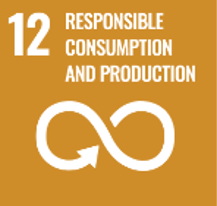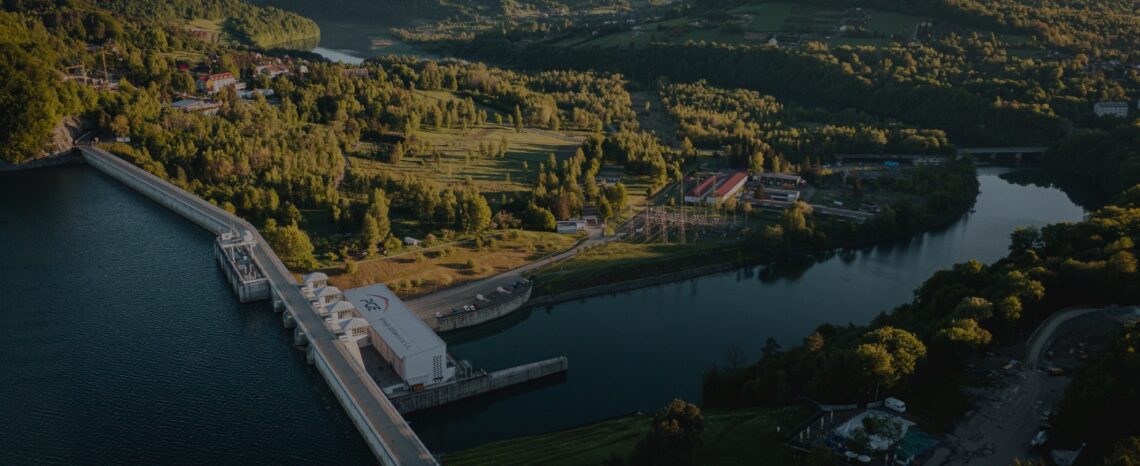Providing energy security has multiple dimensions and is relevant to both on-going operations and long-term investment plans. Generation units from the Conventional Generation, District Heating and the Renewables segments are deployed in ensuring energy security. The Distribution segment also plays an important role.
Energy system foundations
The deployment of generation units in the National Power System depends on energy demand, which fluctuates around the clock and changes seasonally. The Transmission System Operator issues work or stand-by orders to generation units in accordance with the rule that units with the lowest variable cost are deployed first.
As demand grows, the operator engages further (increasingly expensive) generating units, thereby increasing the wholesale price of energy. PGE Group has in its portfolio competitive generating units operating on lignite that, owing to their cost advantage and access to their own fuel, are engaged by the operator also during off-peak hours, in practice 24 hours a day, all week long, which accordingly translates into production volumes and economies of scale in the operation of power generating complexes. Hence, the availability of PGE’s generating assets directly affects energy security and a competitive price of energy for the Polish economy.
Regulatory system services
PGE Group’s generating fleet is distributed throughout the country, which is why we are an important partner for the Transmission System Operator. The operator’s role is to balance the system, i.e. to match demand for electricity with electricity supply.
The most important services provided by PGE Group to the Transmission System Operator include:
- Forced operation, i.e. use of cogeneration units to ensure the quality of energy supply in response to system limitations (of a local nature).
- Use of pumped-storage plants to ensure equilibrium of capacity balance and the quality parameters of energy. Pumped-storage plants are activated at the operator’s request and depending on the needs they can either generate or receive energy.
- Demand management (DSR) – if a shortage or lack of reserves takes place in the system, the operator may try to reduce demand, which consists of voluntary limiting energy intake by energy-intensive customers (e.g. lignite mines).
These revenues constitute stable part of the Group’s revenues, and with the launch of the capacity market, their role increases even more. Thus, PGE’s exposure to the electricity market will become relatively lower.
Capacity market
The Capacity Market was entered into operation from 2021. In November and December 2018, three auctions were held – for the periods starting in 2021, 2022, 2023. The main auction for 2024 took place in December 2019, the main auction for 2025 took place in December 2020 and the main auction for 2026 took place in December 2021. The additional auctions took place in March 2020, 2021 and 2022 – concerning deliveries for the particular quarters of 2021, 2022 and 2023.
Main auctions for delivery years:
| 2021 | 2022 | 2023 | 2024 | 2025 | 2026 | |
| Clearing price (PLN/kW/year) | 240.32 | 198.00 | 202.99 | 259.87 | 172.85 | 400.39 |
| Volume contracted (MW) | 22,427 | 10,580 | 10,631 | 8,671 | 2,367 | 7,189 |
| Multiyear contracts (MW) | 12,459 | 125 | 853 | 5,669 | 166 | 2,678 |
As a result of the above auctions, the PGE Group concluded agreements, securing a revenue of more than PLN 2.5 billion per annum during the next 8 years (2021-2028). Multiyear auctions concern new units (at Opole, Turów and Dolna Odra power plants) or modernized ones. Low-emission units (like Dolna Odra) benefit from the extension of the contracted capacity supply period by 2 years.
Significance of the capacity market for our investments
PGE Group is engaged in long-term projects. The construction of new generation capacities and their diversification are some of the key objectives in the Group’s strategy. The profitability of investments in generation assets cannot be based solely on the volume of energy produced, but requires an additional support system. The solution is the capacity market in which generating units are remunerated not only for the volume of energy produced but also for their willingness to supply it. Obtaining 17 years of support for the construction of new gas-fired capacity at the Dolna Odra plant will provide a solid rate of return on investment, while guaranteeing stable revenues.
Electricity distribution
Delivering electricity to customers is no less important than producing it. As Distribution System Operator, we are responsible for the reliability of energy supplies in the eastern and central parts of the country. We deliver energy to end customers over high-, medium- and low-voltage grids. Ensuring energy security means, above all, continuously maintaining the distribution network in proper shape, conducting essential modernisations and immediately removing failures caused by forces of nature. We want interruptions in energy supply to be as short and infrequent as possible. The quality of distribution services is measured using generally accepted indicators – SAIDI and SAIFI.
The President of the Energy Regulatory Office requires distribution system operators to systematically improve quality indicators, tying this to the level of regulated revenue. The tariff process includes the option to adjust network operators’ remuneration due to objective difficulties caused by weather conditions.
In 2021, the SAIDI and SAIFI indicators and the time to connect new customers to the grid were as follows:
*Estimated revenues based on auction clearing price. Capacity obligation price for multiyear agreements will be adjusted annually with the annual average consumer price index (assumed 3.4% for 2022, 5.1% for 2023, 7.6% for 2024, 6.2% for 2025 and 2.5% in the following years).In addition, remuneration for new or modernised units is lowered by the amount of public aid granted to investments. PGE minimalised the risk that capacity market revenues will be significantly curtailed because of public aid.
PGE is the largest energy company in Poland. PGE’s units meet approx. 43% of the country’s electricity demand and serve over 5.5 million customers, while PGE’s distribution area covers over 40% of Poland’s territory, including areas on the border with Ukraine and Belarus. The Group’s activities are therefore of exceptional importance for the country’s energy security. It is crucial for PGE Group to secure the continuity of operation of power plants and CHPs and distribution infrastructure so as to ensure uninterrupted supplies of electricity and heat to residents, institutions and businesses.
In connection with the situation in Ukraine, a Crisis Team has been established at the central level of PGE Group to continuously monitor threats and identify potential risks. The Crisis Team’s work includes monitoring the security of energy generation and supply and the protection of critical and IT infrastructure. Its tasks also include undertaking actions minimising the risk of a crisis situation, preparing the Group companies in the event of a crisis situation and planning, organising and coordinating works ensuring continuity of the Company’s and PGE Group’s operations.
Crisis teams have also been formed at the Group’s key companies, operating 24 hours a day, carrying out continuous monitoring and identifying potential risks in order to minimise risk to electricity and heat supplies.
All key PGE Group companies have adopted guidelines for developing business continuity plans. On this basis, companies develop and then implement their own business continuity plans that take into account the specifics of the company. A key assumption of business continuity plans is the development of a catalogue of risks for critical processes, on the basis of which emergency scenarios (instructions, procedures) are developed and adopted. The emergency scenarios are periodically tested and continuously updated. In the current situation, companies have been tasked with both urgently updating and reviewing internal regulations and business continuity plans.
Cybersecurity is also particularly important in the current geopolitical situation. PGE Group has implemented special procedures for monitoring ICT networks due to increased activity of criminal groups aiming to attack ICT (Information and Communication Technologies) and OT (Operational Technology) systems. With the CHARLIE-CRP state of alert in force, the emergency plans have been reviewed. A significant change in the company’s operating context triggered the launch of a threat analysis and risk estimation for cybersecurity incidents. There is also an increased focus on protecting the supply chain against cyberattacks.
The security of the Group’s facilities has been strengthened. In order to protect key energy infrastructure, the Group cooperates with all services responsible for security in Poland, with a particular focus on the Internal Security Agency (ABW). In addition, PGE Dystrybucja is continuously supported by the Territorial Defence Forces (TDF).
Key areas in PGE Group affected by the war in Ukraine
- fuel availability and prices,
- disruption to the component supply chain,
- rising inflation and interest rates and weakening of the domestic currency,
- prices of CO2 emission allowances
- greater pressure for energy transition,
- cybersecurity
- geopolitics,
- counterparties (sanction letters).
PGE’s key operating risks related to the war in Ukraine
- reduced availability of hard coal on the Polish market due to the embargo on supplies of this raw material from Russia,
- increase in hard coal prices on the international market,
- logistical disruptions due to the high utilisation of rolling stock and changes to current travel routes,
- reduced availability of biomass on the Polish market due to the suspension of feedstock imports from Belarus,
- logistical disruptions in road transport related to fuel prices and the availability of service providers’ employees.
- CHP Gorzów and CHP Zielona Góra are supplied with field gas (so-called Ln nitrogenous gas). Due to the use of dedicated transmission infrastructure between the mine and the CHP plant, these generating assets are neutral to supply disruptions to Poland’s National Gas System.
- CHP Toruń, CHP Zawidawie, CHP Lublin-Wrotków and CHP Rzeszów are supplied with high-methane gas (so-called gas E). Gas E drawn from the National Gas System is secured in the form of adequate storage, and in Poland this is at a relatively high level.
PGE Group has no influence on the directions of supply and management of fuel transmission therefore the risk of possible disruptions lies with PGNiG and the Transmission System Operator (Gaz-System). PGE has established communication channels with PGNiG and Gaz-System in commercial and operational management in cooperation with the respective PGE Group location. In accordance with national gas supply constraint management programs, securing supplies for electricity and heat generation is favoured over other customers.
- In the case of gaseous fuel, due to the lack of stock-holding possibilities, reduced availability translates into an immediate disruption in electricity and heat production. However, if there are reserve coal-fuelled water boilers at a given CHP plant, heat production is possible until stocks are exhausted (concerns locations Branch Lublin-Wrotków, Branch Rzeszów, in the case of Branch Gorzów Wielkopolski the production reserve is the coal-fuelled OP-140 steam boiler). At the EC Zielona Góra location, the reserve for heat production is constituted by oil boilers.
- The main suppliers of hard coal for electricity and heat production are Polish mining companies. The generating units have reserves of hard coal to enable uninterrupted production of electricity and heat.
The electricity supply for PGE Dystrybucja and PGE Obrót is secured on a commercial basis. The physical supply of energy is conditioned by the current situation of balancing and operation of the National Power System. Disruptions in electricity generation will affect the energy supply depending on the location on the grid in the NPS. So far, PGE Group has not identified any risk associated with electricity or heat supply to residents, institutions and businesses.
The war in Ukraine has contributed to dynamic volatility in the commodity, CO2 emission rights and prices of goods and services, affecting margin levels and capital raising possibilities. The disruption or complete shutdown of a number of production facilities in Ukraine has disrupted the supply chain of components for key investments or significantly raised their prices.
PGE mitigates risks by continuing its policy of hedging electricity generation costs together with energy sales on the wholesale market, which is reflected both in hedging CO2 emission allowances and foreign currencies for transaction purposes.
As a consequence, the aforementioned risks may have a material impact on individual areas of PGE Group’s operations and future financial performance. In particular, the recoverable amount of selected asset items, the level of expected credit losses and the measurement of financial instruments may change.
In view of the dynamic course of the war on the territory of Ukraine and its macroeconomic and market consequences, PGE Group will monitor its development on an ongoing basis and any events that occur will be reflected accordingly in future financial statements.
ICT security



Being aware of the importance of PGE Group’s infrastructure for the country’s energy system and due to progressing digitisation, PGE treats ICT security issues as a priority. PGE Systemy, a PGE Group company, is responsible for ICT infrastructure management and ensuring ICT security. Infrastructure security is subordinated to the Cyber Security Department in PGE Systemy, which also includes a specialised PGE-CERT team responsible for handling ICT security incidents and minimising their potential effects. Counteracting cyberattacks takes place on many levels. PGE-CERT monitors threats to system security, reacts to detected incidents and undertakes actions related to the coordination of incident handling. PGE Systemy continuously improves competences and skills of the Cybersecurity Department employees through training. The PGE-CERT team has an international accreditation of the Trusted Introducer organisation, it is also a member of FIRST.org, a leading organisation associating teams responding to incidents. Since 2020, it has had the status of a certified CERT team. It has also undergone independent certification for compliance with ISO 22301 and 27001.
To secure the infrastructure, technical safeguards are in place to protect PGE Group against malware, targeted attacks and denial of service attacks. Thanks to the implemented software, computers operating in PGE Group network are monitored on a regular basis. Procedures regulating employees’ rights and obligations with respect to IT security have been implemented in the entire company. Among other things, it is prohibited to use company IT devices for private purposes, to use social media except when it is necessary (PGE Group profiles), to log into private email accounts and to use unsecured Wi-Fi networks.
It is exceptionally important to build IT security awareness among the employees of PGE Group through education and on-going information on possible and existing threats, reminding of the principles of safe use of computers, the Internet and company mobile phones. Articles and information on this topic are published in internal company media.
Access to corporate resources from the Internet is based on encrypted VPN connections. In order to enable remote work by PGE Group employees, the VPN infrastructure and group communication and teleconferencing environment have been developed.
Employees are equipped with PKI (Public Key Infrastructure) certificates, which are used to secure e-mail messages and electronically sign documents. Computer equipment used for remote work has disk content encryption enabled. We have also developed instructions and advice on IT security rules for remote work, which have been published on PGE Group intranet.




